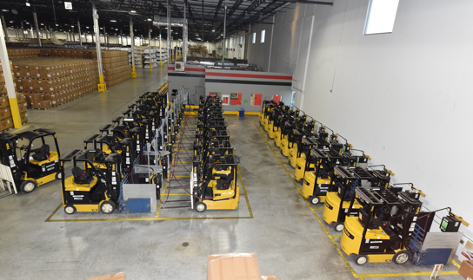 Li-ion will save the company USD2,800 per truck compared to lead-acid |
US small engine manufacturer Briggs & Stratton has switched to lithium-ion batteries as it consolidated its US distribution centres.
In 2019, the company merged its smaller warehouses across the US into two large distribution centres and switched forklift fleets at both locations to Li-ion batteries from previously used lead-acid batteries.
About 10 years ago, the company started to experiment with an alternative charging pattern of the wet-cell batteries of its materials handling fleet to increase uptime.
At the same time, Bill Harlow, the company's global warehousing director, had been closely following the developments in Li-ion technology. One of the company's commercial brands, Vanguard, has a line of lithium-based power solutions.
Harlow asked his long-time trade partner Dwayne Lawhorn from YES Equipment to help evaluate the available options for the two new distribution centres.
The initial comparison included all available alternatives of power sources: fuel cells praised for their safety, Li-ion batteries for longevity, and wet-cell batteries and LPG (propane) for lower initial costs. Both battery types and LPG went into the total cost of ownership calculations.
"The cost analysis made the decision straightforward," says Lawhorn. The estimate was based on the 15 years of operations of 54 trucks, alternatively powered by LPG, lead-acid and OneCharge lithium batteries, and factored in the lease, daily maintenance and fuel/electricity costs.
"The Li-ion option was by far the most attractive: it demonstrated a savings of USD2,800 per truck compared to lead-acid and USD8,100 compared to LPG. Accumulated over the full period for all 54 units, the savings add up to USD2.2 million against lead-acid and USD6.6 million for LPG."
Once the deal was sealed, there was no problem fitting all of the new Class I and III forklifts with the optimal Li-ion batteries.
One and a half years after the start of the operations at new distribution centres powered by Li-ion batteries, Briggs & Stratton has seen no issues with the equipment, and Harlow is happy with the performance boost. No leaking acid, none of the downtime associated with lead-acid batteries and "what's nice about lithium batteries is that there is no memory effect! You can randomly charge it at 90% or at 10%," he says.